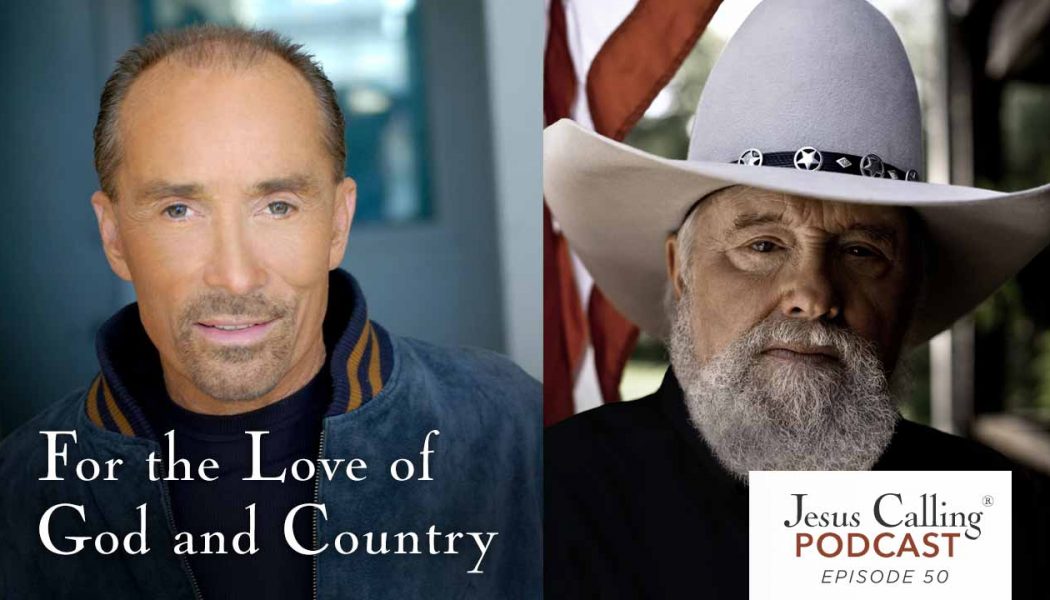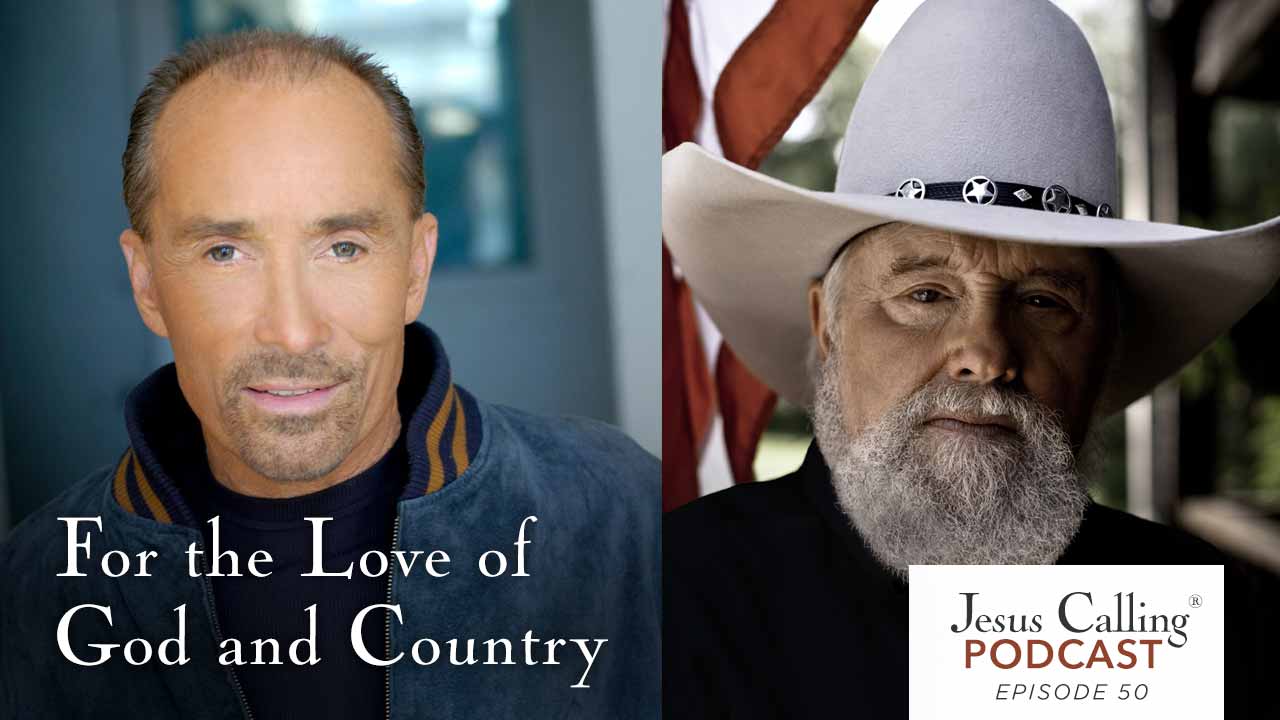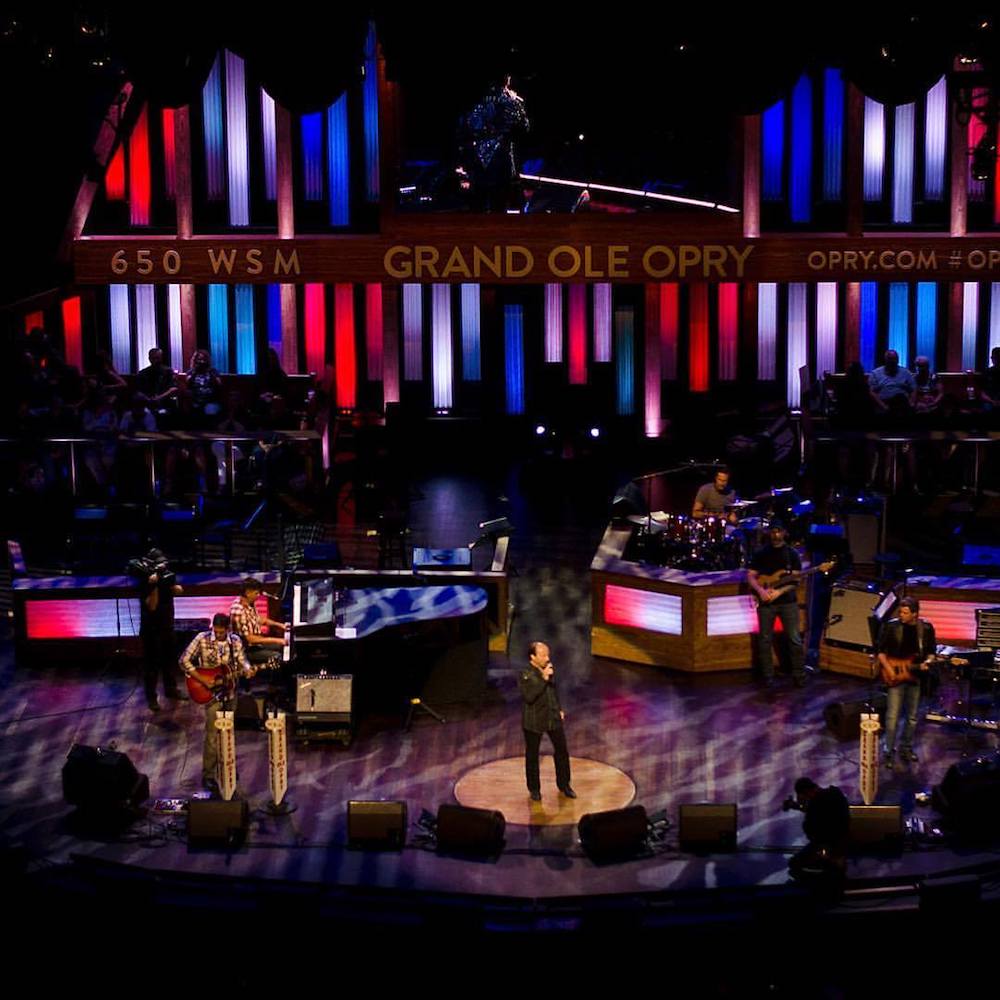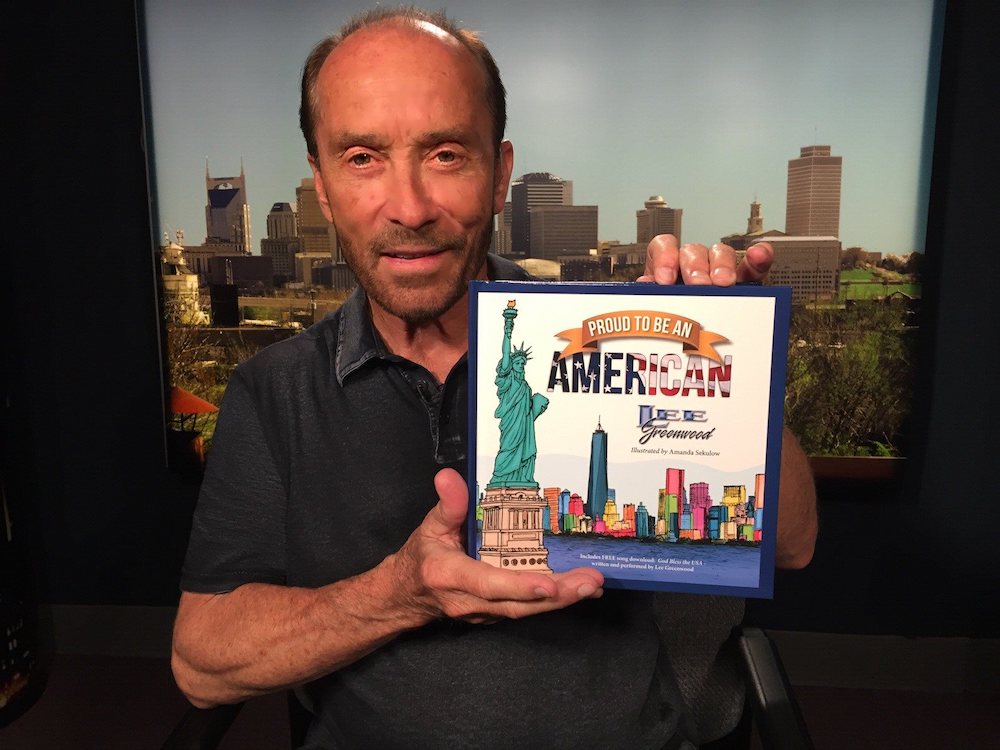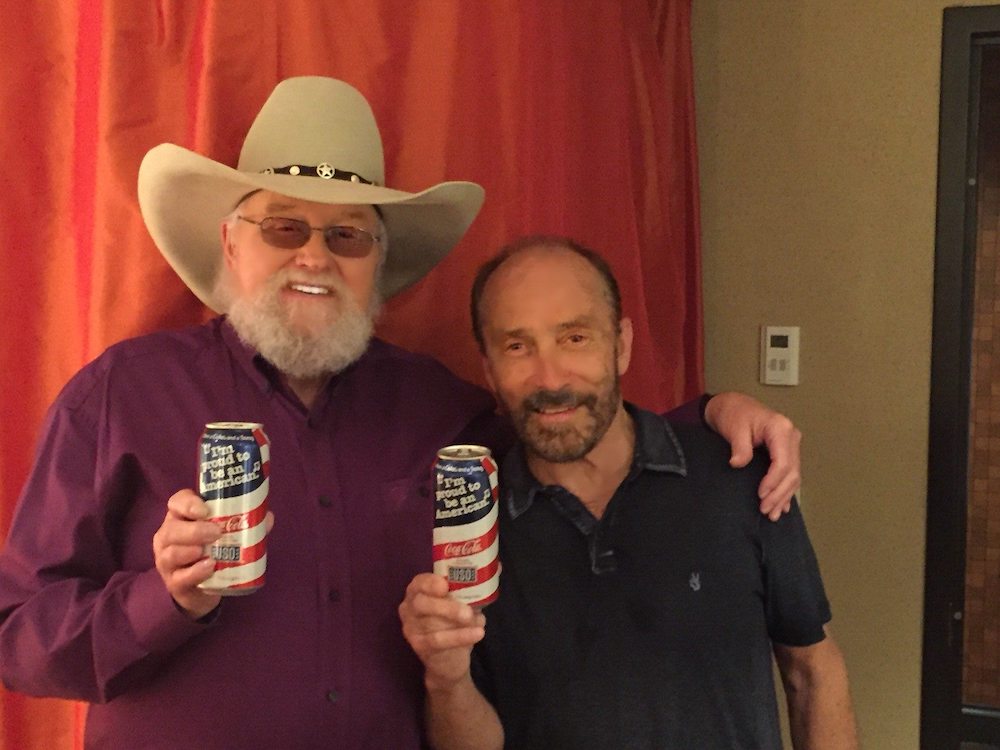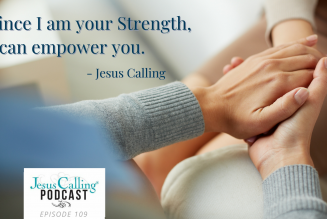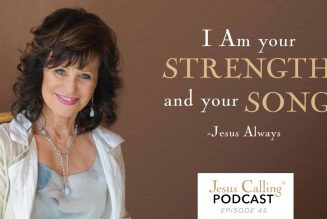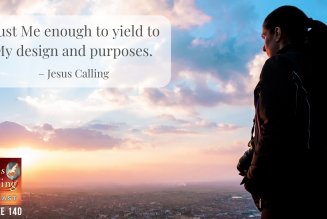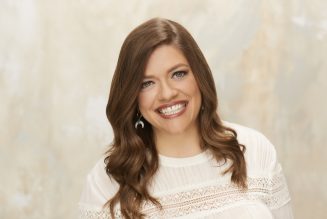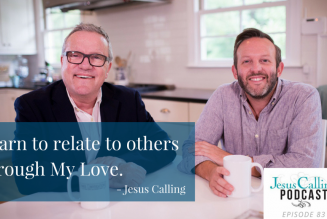Lee Greenwood and Charlie Daniels are legendary country entertainers and strong men of faith. With a deep love for our country and admiration for the service of our military personnel, they both endeavor to speak about their faith openly and are each deeply involved in Veteran relief organizations.“ Lee’s song “God Bless The USA,” has been voted the most recognizable patriotic song in America. In our first segment, we catch up with Lee by phone to talk about his faith, his career and the song that became one of our country’s most beloved anthems.
Narrator: Welcome to the Jesus Calling Podcast. Today, we have a very special episode with guests who talk about the importance of God and Country. Lee Greenwood is a Grammy-winning singer, author, writer, and musician with numerous number one hits. His self-penned song titled “God Bless The USA” has been voted the most recognizable patriotic song in America. We caught up with Lee by phone to talk about his faith, his career and the song that became one of our country’s most beloved anthems.
The Musical Roots of Lee Greenwood
Lee Greenwood: I’m Lee Greenwood; author, entertainer, writer, singer, musician. I live in Nashville, Tennessee and am a country touring artist. I sang in the First Baptist Church probably from the age of 10 to about 14,15.
I also loved singing at church. I think I gained great ear training from my harmonies and I loved going on Wednesday night instead of Sundays, because Saturday night I was usually working very late, even in high school and Wednesdays I always had the fellowship with BYU. So, it was kind of cool.
My grandmother had said to me when I was about 12 or 13, when she realized I was being creative in writing music, if I was to proceed and have a career in music, and we didn’t know at that time if I would, I was just a working musician. She said, “if you ever get to be known for something, make sure it’s something that you’re proud of.”
So my career, when it started in Nashville at MCA, we were signed with Barbara Mandrell and Reba McEntire, George Strait, The Oak Ridge Boys. We all had interesting careers expanded in different ways. I took the avenue, I guess, that they gave me, and that was; I felt that my delivery of a song was sincere. They gave me these songs, I mean Jerry Crutchfield my producer and I picked them all out over the 18 years I was there, that really lent itself best to the quality of my voice and how I could deliver them. They were generally about relationships, and hardships, and crisis and things that people believe, because of the way that I delivered them.
I never thought, along the way, that there would be some song I just wrote because I felt I needed to, would become the lasting song of my career. You have to realize there were five or six albums that I had before I ever wrote “God Bless the USA” that produced 11 or 12 number one hits; country songs. I toured with every country act in the business. So when I wrote “God Bless The USA,” it was just another one of those songs I was adding to my discography at MCA. But it became apparent later on, when the song was chosen by Universal to the single release, that it became the most powerful moment in my performance and all my shows. So that became a focal point after of course Katrina, The Gulf War and the attack on America in 2001. Then it became even more of a military anthem and a way to unite the country. That’s the way I had intended it from the very beginning was a song to unite Americans.
I never intended God Bless the USA to be a military anthem. I mean, it was really telling the story of an American, and I was kind of surprised, to tell you the truth. I mean, it obviously hit the target with the public.
Gaining Strength Through Faith
Narrator: “God Bless the USA” went far beyond what Greenwood expected when he wrote it on the back of his tour bus in 1983. His desire, in writing the song, was to promote unity in our country and keep patriotism alive. That desire has carried on into a new book for children that Lee has authored called “Proud to Be An American” which teaches kids and families about patriotism.
Lee: So our book is called Proud To Be An American, which is kind of the second reference to my song “God Bless the USA.” It is the lyrics of the song, but made with childlike illustrations, that a very small child finds fascinating, because we had it tested in numerous families and that’s what they grasped. So in it, of course, are pictures of me growing up and the places that I visited across this wonderful country.
If you live by the faith, you’re not afraid of that storm.
I think family is important. When I find someone that has no support of a family. I tend to gravitate toward them to give them some security, a feeling of security. But if you have family, you need to trust in that strength and protect your family, and make sure that you do what’s right for your senior citizens as they grow older. It takes more than a parent to raise a child. So if you have somebody around you that is struggling raising children, help them. That gives you a sense of pride as well, that you can help a young man or young girl develop into adulthood.
Faith gives strength. You have to know, as a young boy particularly growing up, that there’s something stronger than your father. You have to know there’s something stronger there that can protect you when you’re in harm’s way or in crisis. I think that’s what I’ve lived by, since I became a born-again Christian through my wife. That’s the kind of faith that I always have, no matter where I perform, no matter what kind of disaster or crisis I may face. There’s a story; you’re either coming out of a storm, you’re living one, or you’re about to have one. If you live by the faith, you’re not afraid of that storm.
The Lesson Of Patriotism
One of the reasons I wrote the book “God Bless the USA,” or Proud To Be An American. was because less and less families, per capita, has a soldier in their family. So that’s how we got our lessons from patriotism, by the men and women who served in our family. It made you more reverent and more love for the country. As we move forward, of course, it gets less and less because of the numbers—it’s just a number thing.
We’re with a group called Helping a Hero out of Houston. Their website is HelpingAHero.org. We’ve built over 160 homes in 22 states in eight years for use of these soldiers that have paid a tremendous price to keep terrorism off our shores. So, because I’ve sort of become a hero for them, I wanted to have a book that teaches patriotism to children.
We read to our kids when they were a year, and up to four or five years old then they’re reading to us. One of the lessons we actually regretted–we did not have a book–was to teach the lesson of patriotism–what does it mean to be a patriot?
In the very back of the book, I wrote a dedication, and I’ll read it to you.
I dedicate this book to Jesus Christ for His never-ending grace. To Kim, my beautiful wife, who continues to teach me the true meaning of love. To our sons Dalton and Parker who show honor to this family and their country in everything they say and do. And my grandparents who taught me the wrong from right. They gave me the chance to find my destiny. And last, but not least, our military, that sacrifices beyond measure for the freedoms we enjoy every day. So as we move toward the Fourth of July, and today is a special day for America as we celebrate our freedom, may just be a lasting message to everyone who believes in our country.
Narrator: For more information on Lee Greenwood’s new book for children, Proud to Be An American, please visit LeeGreenwood.com and to find out how you can be a part of helping to provide wounded veterans with specially adapted homes, please visit helpingahero.org.
Narrator: Next, on the Jesus Calling podcast, we are pleased to re-air a segment with country music icon Charlie Daniels. A musician, man of faith, and a patriot, Charlie has written a book about his life called Never Look At the Empty Seats which comes out in October 2017. We’ll get to our interview with Charlie right after this message about a free audiobook from Audible.com.
As a special offer to you, the listeners of The Jesus Calling podcast, Audible is offering a free audiobook download with a free 30-day trial to give you the opportunity to check out their service.
Find your favorite Sarah Young titles, including Jesus Calling and Jesus Always in an audiobook version and get it for free by trying audible.com. Check out a small sample of the Jesus Calling audiobook, featured at the end of this podcast. To download an entire free audiobook today, go to audibletrial.com/JesusCalling. Again, that’s audibletrial.com/JesusCalling for your full, free audiobook. Now, on to our interview with Charlie Daniels.
Charlie Daniels: The Early Years
Charlie Daniels: I was five years old when Pearl Harbor was bombed. I come from Wilmington, North Carolina, which is a sea coast town. I remember … It was the days before television and we … My granddad had a big old full model radio and remember being with my family. It was a real gray Sunday and I remember hearing on the radio … There was a scratchy overseas broadcast – it was talking about the Japanese Imperial Air Force had bombed our naval base in Pearl Harbor. I was much too young to grasp the gravity of the situation, I knew something very serious that happened in my formative years were during the Second World War.
Narrator: Charlie Daniels has had a very successful music career spanning decades, with multi-platinum selling records. Along with his musical endeavors, Charlie is involved with an organization that gives help and aid to US Veterans. Charlie shares some scenes from his early years that have influenced where he is today and the faith that accompanied him all along the way:
Charlie: I was born in Wilmington, North Carolina and I had gone to first grade all of two weeks and my dad changed jobs and we moved to Valdosta, Georgia. I lived in North Carolina, South Carolina, and Georgia in my formative years. My dad’s job kept moving around a lot, so I went to as many as three schools in a year’s time more than once, but I finally landed on my feet in a little town called Gulf, North Carolina, which is in the central part of the state. I went to all of my high school days at the school in Goldston, North Carolina, class of 1955 had 22 graduates in it.
The Beginning Of Charlie Daniels’ Music Career
I’ve always loved music, my family’s always loved music although there was hardly anybody that actually played and certainly nobody played well enough to have the patience to show me how to do it. I went up to … As the good Lord would have it, I went up to my friend’s house one day, a guy I had known for a long time. I had no idea that he had a guitar. He had an old Stella guitar. The strings probably had never been changed on it, neck about the size a half of a fence post and it’s strange way up off the neck, but he knew about two and a half chords on it. I said “You got to show me that. I’ve always wanted to know how play.”
Anyway, to make a long story short, he showed me that and then we started bugging everybody that we could find that knew one more chord then we did. I can’t read music, I learned to play completely by ear. I played guitar for a while and then started playing mandolin and the fingerboard on mandolin and fiddle is the same. Of course you play one with a pick and one with a bow. Somebody showed up with a fiddle one day and I had to give that a shot. I started with it and one of the kids I went to school with said when I played the fiddle it sounded like somebody stepped on a cat because I do it all wrong. I didn’t know any better. I just tried to get comfortable with it and just sawing on it.
I started playing when I was probably about 15 years old and we played square dances and any place that would get somebody that get us to play a song for learning to play. I moved back to Wilmington, North Carolina in 1956 and there was a lady that was putting together a band to play in Jacksonville, North Carolina, which is the home of the Second Marine Division. It was one of the few places where they could have music for six nights a week. I was working a daytime job, I used to drive 50 miles up, play, drive 50 miles back, go to work early in the morning. About 1950 … If this was 1956, I started doing this …
Charlie Daniels: Nashville And Capitol Records
I moved to Nashville in ’67. I was already pretty seasoned into show business when I got here, but of course Nashville was a different … was a horse by a different color, it was recording, creating, and that sort of thing rather than performance. I moved here with a 20 dollar bill and the clutch out of my car and a wife and a baby. That’s just one of the many stories around … You get around Nashville, you start with the people that came here.
I thought I wanted to be behind the scenes. I started doing record production and playing some sessions and stuff like that, but actually, all the time I had this burning desire to get back on stage because it’s what I wanted to do. It’s where my heart was. It’s where my talent mostly is. My first recording contract came about in a very odd way. I was producing an act in San Francisco, a guy named Jerry Corbett. He was on Capitol Records and we were in LA one day playing some of the sides we had recorded for the brass at Capitol, so they could hear what we were doing. Jerry’s manager, a guy named Donald Ruben, said … He had heard some of my songs and said “Charlie, why don’t you play some of your songs?” There was a guitar there and I picked up the guitar and started playing some of my songs. There was a guy in the room from Capitol Records. He signed me on the spot. That’s what began my recording career, of course there’s to be a while before we made much noise in records, but that’s how it started. It’s funny how some of the things … Some of the best things that ever happen to you happen off the cuff, things you don’t plan, things you don’t look for, they’re total surprises when they happen. So many times I’ve had things happen to me like that.
God And Country: Protecting America
Narrator: Charlie went on to record numerous hits, and had the opportunity to share the stage with many huge musical icons while creating his niche in country music. Although he’s still in the business of making music, Charlie has several other passions these days, as well. One of them is being involved with a non-profit organization called the “Journey Home Project.” He shares what led him to get involved in this area:
Charlie: Wilmington played a very strategic part in the Second World War. There was a shipyard there that built Liberty Ships. There was a port there that oil tankers and cargo ships came out and went through the mouth of the Cape Fear River and over across the Atlantic Ocean to service our military over in Europe. A lot of them were sunk just off our coast by German U-Boats that laid just off our coast, German submarines. It’s said, I never saw because I was too young to do that, but it is said that you could see the fires of battle from our beaches sometimes. That’s how close the war was and we took it very seriously.
I learned very early in my life that and I say this on stage every night “Only two things protect America. It’s the grace of almighty God and the United States military,” it’s that way in 1941, it’s that way this year, next year, the year after, as long as this country remains free, it will be that. It’s a part of who I am to respect and support the military.
I’ve been among these guys. I’ve been into war zones with these guys. I’ve seen them. They spend their time in places you don’t even want to go to where there’s nothing. Some people seem to think for some reason or another that our military people have an extra gene that isolates them from missing their families and loneliness and that sort of thing. It’s not so, they miss their families just as bad as anybody else does that’s away from them. They go and do that because they’re patriots and the least that we can do is respect and support them. I’m there. I respect them. I support them.
Charlie Daniels And The Journey Home Project
That’s what Journey Home is all about. We try to soften the landing for our military men and women who come back from service, most of them from battle areas, combat areas. We do things like we try to have them get educated if they need education. We try to help them do anything that we can to make them feel back … To crawl back into society … To come back into society … To come back in and feel a part of it. Back during the Second World War and some of the other wars we fought, people that two or three weeks to get home on a ship. Now you get on a plane, and one day you’re back in the USA. You get off … You come out of a combat zone and you fly in and you get out and walk out the airport, you’re on the city streets somewhere. It’s a world that’s very foreign to you sometimes and sometimes it takes a little readjustment, some people more than others, but we just try to help anyway we can.
Well, we’re dependent on donations. Basically advance, we don’t solicit … particularly solicit individual donations, although we’d take them if somebody send them in. We work hard for it. Volunteer Jam last year was a big money raiser for us. I think we did about $300,000 off of it mainly due to sponsor money and that sort of thing. We do an event at the Palm every year. Somebody that wants to get involved can come to that and have fun at the same time. We allocate funds to the people we feel like are more deserving and where it would be put to the best use.
Sustained Faith In Difficult Times
Narrator: As passionate as Charlie is about helping U.S. Veterans, he is also passionate about his faith. Charlie describes how that faith sustained him through some difficult times:
Charlie: I like to think that my faith impacts everything that I do and everything that I am. That I am … I’m writing a biography right now and the hardest part for me to write was on my faith – was trying to express my feelings and my … what I feel and what I … my feelings, my concept of what Christianity is and what it means. I had to get pretty introspective about it and it was a hard part for me to write.
This is for everybody. This one shedding of blood covers your sins. You repent, you believe, and you act on it.
And I got figuring the only … the one perfect human being ever born, since Adam and Eve. One perfect human being without blemish, without sin, was Jesus Christ. So He broke the chain.
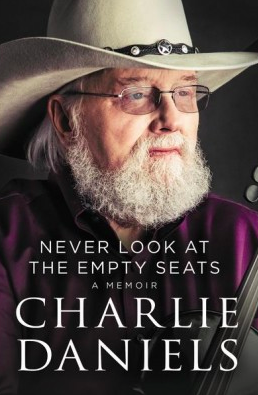 It’s like “This is for everybody. This one shedding of blood covers your sins. You repent, you believe, and you act on it.” Commit the 91st Psalm to memory, “We live within the shadow of the Almighty. Sheltered by the God who is above all gods.” I could do the whole thing, I memorized it a long time ago. It’s a psalm of protection. I have repeated that in a lot of different situations, but that’s … Getting to the meat of your question, I was about 20 miles off a snowmobile trail when I had a stroke. I first of all thought it was a … My left hand started going numb. I thought it was because of the lever I was using over there. I got to feeling – it was down in my foot, it was up in my jaw and I said “Something’s wrong here, we need to go.” I told the people that I was with “Let’s head back down the mountain.” I was able to ride a snowmobile all the way back down the mountain. Then a series of things started happening.
It’s like “This is for everybody. This one shedding of blood covers your sins. You repent, you believe, and you act on it.” Commit the 91st Psalm to memory, “We live within the shadow of the Almighty. Sheltered by the God who is above all gods.” I could do the whole thing, I memorized it a long time ago. It’s a psalm of protection. I have repeated that in a lot of different situations, but that’s … Getting to the meat of your question, I was about 20 miles off a snowmobile trail when I had a stroke. I first of all thought it was a … My left hand started going numb. I thought it was because of the lever I was using over there. I got to feeling – it was down in my foot, it was up in my jaw and I said “Something’s wrong here, we need to go.” I told the people that I was with “Let’s head back down the mountain.” I was able to ride a snowmobile all the way back down the mountain. Then a series of things started happening.
Charlie Daniels Recounts God’s Plan
I was in Durango, Colorado. We were on the same side of town as the hospital. We could have been 90 miles the other way. We had one … Never … The people that always hold a snowmobile trailer had not brought one. I had two extra snowmobiles and they used my snowmobiles that day, so they had a car with no trailer on it. We drove into to the hospital. I went into the hospital, they gave me a TCP shot. I had about 15-20 minutes left to do it in because it loses its effectiveness after a while. God, hospital, this side of town, God, car without a trailer on it, God having this shot when I got there, God.
I know doctors treat, God heals.
They put me on an airplane and took me to Denver to Swedish Hospital. When I got there, I found out the people that … One of the people that worked at Swedish Hospital was doing some work with the hospital in Durango. They had only had that shot in their hospital for about three months, God. That was all … That was laid out. I’m going to have a stroke, but I’m going to have it in a place where we can get back down the mountain. We can get the help. We can get … I mean I know doctors treat, God heals.
Charlie Daniels And Jesus Calling: An Everyday Devotion
Narrator: Another part of Charlie Daniels’ faith experience has been the practice of reading Jesus Calling daily. Charlie remembers the day he discovered Jesus Calling, and since then, he and his wife have made it a part of their everyday life.
Charlie: It’s been several years ago, and I’ll be married 52 years in September, so I’m pretty seasoned into the ways of married life. I know when my wife goes shopping, if I go with her, best thing for me to do is just find … Take a good book or find something I want to do or look around. Anyway, I think we were in Flagstaff, Arizona on a day off, and she went. I went in a bookstore, and I looked down and there was a leather bound book there. That’s what it was, Jesus Calling. I picked it up and looked at it and went and bought it. You know what’s amazing about it? I’m sure you’ve probably encountered this a lot as you’ve done these interviews. It’s amazing how much the daily reading applies to something that’s going on in your life at that time. I found it to be that way.
I read it everyday. I read Jesus Calling everyday. My wife reads it everyday. I don’t know how many copies we’ve given away. We keep giving them away for Christmas or give a couple of cases of them and pass them out to friends and people. It’s just part of my devotional everyday. It’s amazing how much … I’ve talked to other people who said the same thing. You get up in the morning, and you read Jesus Calling. It’s got something to do with something that’s going on in your life. It’s just part of my devotional. It’s part of my reading, what I do every morning.
Charlie Daniels And The 91st Psalm
Narrator: Charlie’s legacy in music is well-known, and his endeavors to help others, as his faith leads him, will continue to build his legacy for generations to come. Once again, Charlie:
Charlie: There’s a scripture in the Bible for just about everything we’re confronted with, but I’ve committed to the 91st Psalm to memory a long time ago. I’ve said it in mind flying in helicopters in Iraq. I’ve said it in my mind anytime that I feel in a need that I need to do it because he is ultimately in charge. I’m not going to say bad things will not happen to you, absolutely, but it’s not … You’re in His charge. He’ll take care of you. He’s taken care of me for almost 80 years.
Narrator: Charlie shares a passage of Jesus Calling that has been meaningful to him:
“I love you regardless of how well you are performing. Sometimes you feel uneasy, wondering if you are doing enough to be worthy of My Love. No matter how exemplary your behavior, the answer to that question will always be no. Your performance and My Love are totally different issues, which you need to sort out. I love you with an everlasting Love that flows out from eternity without limits or conditions. I have clothed you in My robe of righteousness, and this is an eternal transaction: Nothing and no one can reverse it. Therefore, your accomplishment as a Christian has no bearing on My Love for you. Even your ability to assess how well you are doing on a given day is flawed. Your limited human perspective and the condition of your body, with its mercurial variations, distort your evaluations. Bring your performance anxiety to Me, and receive in its place My unfailing Love. Try to stay conscious of My loving Presence with you in all that you do, and I will direct your steps.”
For more information on Charlie’s new book, Never Look at The Empty Seats, visit Charliedaniels.com. For more information on how you can help veterans through the Journey Home Project, visit TheJourneyHomeProject.org
Narrator: Next time on the Jesus Calling podcast, our show focuses on how to face our fears and be authentic. Our guests are Kellie Balarie, the author of “Fear Fighting” and Esther Fleece, the author of “No More Faking Fine.” Here’s a preview from our interview with Kellie Balarie:
Kellie Balarie: I just want everyone to know that you are not bad, you are not a lost child, you are not forgotten because you feel fear. Your story is special, and God is going to work through it powerfully to do a mighty, mighty work, when you submit it to Him. Today’s a new start, a new beginning—just come to God–submit it to Him. Bring it to the bottom of the cross. Bring it to His feet, just your heart. Hear His words for you. Hear His heart for you. I don’t think God is going to lead you wrong.
Narrator: Hear more great stories about the impact Jesus Calling is having all over the world. Be sure to subscribe to the Jesus Calling Podcast on iTunes. We value your reviews and comments so we can reach even more people with the message of Jesus Calling. And if you have your own story to share, we’d love to hear from you. Visit JesusCalling.com to share your story today.
